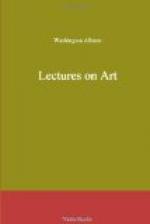But though the position here advanced must necessarily exclude many objects which have hitherto, though, as we think, improperly, been classed with the sublime, it will still leave enough, and more than enough, for the utmost exercise of our limited powers; inasmuch as, in addition to the multitude of objects in the material world, not only the actions, passions, and thoughts of men, but whatever concerns the human being, that in any way—by a hint merely—leads the mind, though indirectly, to the Infinite attributes,—all come of right within the ground assumed.
It will be borne in mind, that the conscious presence of the Infinite Idea is not only not insisted on, but expressly admitted to be, in most cases, unthought of; it is also admitted, that a sublime effect is often powerfully felt in many instances where this Idea could not truly be predicated of the apparent object. In such cases, however, some kind of resemblance, or, at least, a seeming analogy to an infinite attribute, is nevertheless essential. It must appear to us, for the time, either limitless, indefinite, or in some other way beyond the grasp of the mind: and, whatever an object may seem to be, it must needs in effect be to us even that which it seems. Nor does this transfer the emotion to a different source; for the Infinite Idea, or something analogous, being thus imputed, is in reality its true cause.




